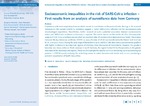Socioeconomic inequalities in the risk of SARS-CoV-2 infection – First results from an analysis of surveillance data from Germany
Wachtler, Benjamin
Michalski, Niels
Nowossadeck, Enno
Diercke, Michaela
Wahrendorf, Morten
Santos-Hövener, Claudia
Lampert, Thomas
Hoebel, Jens
Experiences with acute respiratory diseases which caused virus epidemics in the past and initial findings in the research
literature on the current COVID-19 pandemic suggest a higher SARS-CoV-2 infection risk for socioeconomically
disadvantaged populations. Nevertheless, further research on such a potential association between socioeconomic
status and SARS-CoV-2 incidence in Germany is required. This article reports on the results of a first Germany-wide
analysis of COVID-19 surveillance data to which an area-level index of socioeconomic deprivation was linked. The analysis
included 186,839 laboratory-confirmed COVID-19 cases, the data of which was transferred to the Robert Koch Institute
by 16 June 2020, 00:00. During the early stage of the epidemic up to mid-April, the data show a socioeconomic gradient
with higher incidence in less deprived regions of Germany. Over the course of the epidemic, however, this gradient
becomes less measurable and finally reverses in south Germany, the region hardest hit by the epidemic, to the greater
detriment of the more deprived regions. These results highlight the need to continue monitoring social epidemiological
patterns in COVID-19 and analysing the underlying causes to detect dynamics and trends early on and countering a
potential exacerbation of health inequalities.
Dateien zu dieser Publikation
Keine Lizenzangabe

